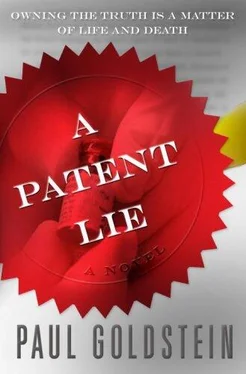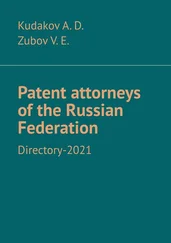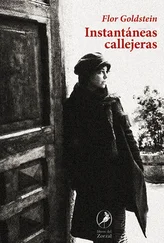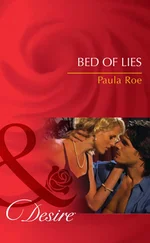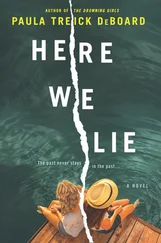Paul Goldstein - A Patent Lie
Здесь есть возможность читать онлайн «Paul Goldstein - A Patent Lie» весь текст электронной книги совершенно бесплатно (целиком полную версию без сокращений). В некоторых случаях можно слушать аудио, скачать через торрент в формате fb2 и присутствует краткое содержание. Жанр: Криминальный детектив, на английском языке. Описание произведения, (предисловие) а так же отзывы посетителей доступны на портале библиотеки ЛибКат.
- Название:A Patent Lie
- Автор:
- Жанр:
- Год:неизвестен
- ISBN:нет данных
- Рейтинг книги:3 / 5. Голосов: 1
-
Избранное:Добавить в избранное
- Отзывы:
-
Ваша оценка:
- 60
- 1
- 2
- 3
- 4
- 5
A Patent Lie: краткое содержание, описание и аннотация
Предлагаем к чтению аннотацию, описание, краткое содержание или предисловие (зависит от того, что написал сам автор книги «A Patent Lie»). Если вы не нашли необходимую информацию о книге — напишите в комментариях, мы постараемся отыскать её.
A Patent Lie — читать онлайн бесплатно полную книгу (весь текст) целиком
Ниже представлен текст книги, разбитый по страницам. Система сохранения места последней прочитанной страницы, позволяет с удобством читать онлайн бесплатно книгу «A Patent Lie», без необходимости каждый раз заново искать на чём Вы остановились. Поставьте закладку, и сможете в любой момент перейти на страницу, на которой закончили чтение.
Интервал:
Закладка:
Leonard said to Seeley, “You didn't tell me how your meeting went with Alan Steinhardt. He's impressive, isn't he?”
“A legend.”
“Alan can be a pain in the ass, but he's a talented scientist. He's won all the prizes but the Nobel. It takes vision like his to design this kind of research, much less pull it off. Looking for an AIDS vaccine is like running a marathon, except no one gives you a map to show you the route or even how far it is to the finish line. If there is a finish line.”
Seeley said, “I need to be sure he got there all by himself, and that Lily Warren wasn't there, too.”
Renata said, “Lily Warren?”
Leonard said, “Twenty years ago, if you asked the best scientists in the business how long it would take to come up with a true AIDS vaccine, they would have told you ten years. If you asked them the same question today, do you know what they'd say?”
“Ten years?”
“AV/AS is as close to a real vaccine as anyone's come. It's not like a polio vaccine or measles. It's not a cure-all. Maybe in ten years we'll have a vaccine that is. But right now, this is the best chance we have to save some of these people. Maybe the only chance.”
Renata said, “Do I know Lily Warren?”
“She worked with Alan at UC, before he came to work for us.”
“And,” Seeley said, “she went to work for St. Gall.”
Leonard said, “St. Gall used her to try to get a look at Alan's notebooks. They were desperate to develop a vaccine strategy. From the papers he was publishing, they knew he was onto something, but they didn't know what.”
Seeley said, “How do you know that?”
“One of our security guards found her in Steinhardt's lab alone, after hours.” Leonard chewed as he spoke. “You've got a first-year lawyer on your team who made herself a hero on this. She was going through our security reports, trying to find evidence of industrial espionage, and when she sees Warren's name on one of the reports, she remembers that she was on St. Gall's witness list. That's why St. Gall agreed to stipulate priority. They'd look like common thieves if this came out at the trial.”
First the stipulation, then the story behind it. What else was his client hiding from him? “Barnum never told me this.”
Renata had finished her dinner and risen from her place. “I have an early day tomorrow. Like Mike.”
Leonard didn't hear her. “Ed must have forgotten. Our deal with St. Gall is, they don't challenge our priority, we don't go to the DA with criminal charges.”
Seeley felt Renata standing behind him. “Did Pearsall know about the deal?”
“Of course he did,” Leonard said. “He brokered it.”
“I'm glad you came,” Renata said. “Are we going to see you tomorrow night?”
Before he could answer, Leonard said, “Joel Warshaw's having a benefit at his house tomorrow night. He wants to meet you.”
Warshaw was Vaxtek's chairman, but that didn't mean Seeley had to go to parties at his house. “I have a trial to prepare for.”
“Joel doesn't come in to the office,” Leonard said. “He works out of his house. This is a command performance.”
All the more reason not to go, Seeley thought.
“Come by here first,” Renata said. “We'll drive over together. It's just a few blocks.”
“I'll see if I have the time.”
Leonard gave Renata a brusque wave as she left the room. Seeley, although she hadn't touched him, had for the briefest moment the sensation of her hands lifting from his shoulders.
In the living room, Leonard added a log to the fire and took the easy chair across from Seeley. “This is how it used to be, isn't it? The Seeley boys, taking care of each other.”
Seeley didn't know if it was the wine, or the end of what was probably a long day, or maybe just the person Leonard had become-altogether, they hadn't spent more than two or three days with each other in the thirty-two years since Seeley left home-but it occurred to him, as it had in Buffalo, that there was an unquenchable hole at the center of his brother's life, one that for some reason he thought he could fill with family.
“I haven't done anything for you yet. The thought of Steinhardt on the witness stand bothers me.”
“And that's the only problem?”
“I don't like how broad your patent is.” Patents can be broad or narrow, and Steinhardt's patent claimed that the invention included not only AV/AS but anything remotely similar to it. The problem was that, like any other target, the broader a patent is, the easier it is for a competitor like St. Gall to shoot it down in court.
“That wasn't Steinhardt's call. The decision came from the top. Joel.”
Warshaw was an entrepreneur, not a scientist. From a business-magazine cover story two or three years ago, Seeley knew that Warshaw had founded and sold three software companies in less than ten years. Six months before the dot-com crash, when everyone in Silicon Valley, including the guys who waxed and detailed his car, were making paper fortunes on Internet stocks, Warshaw sold all of his holdings and with part of the proceeds bought a controlling stake in Vaxtek. At the time, it was a struggling biotech with neither products nor patents, but with huge sums of money invested in research. Seven years later, with a small portfolio of patents and two drugs on the market that hadn't yet paid back their investment, Warshaw was beginning to realize that the human immune system is considerably more resistant to quick fixes than computer software.
“Joel wants a blocking position. That way, if anyone comes within a mile of us, we can nail them. If all we got out of our investment in AV/AS was a patent that anyone could copy if they made the smallest change, we'd be out of business anyway. Joel knows it's a crapshoot. All or nothing.”
“What happens if you lose?”
“We have other drugs, but, like I told you, this is the big one. If we lose, the stock will take a hit and Joel will sell the company to one of the big pharmas-Pfizer, Merck, Novartis-for whatever he can get.”
“And if you win, you'll be rich.”
“Believe it or not, Mike, this isn't about money. If we wanted to get rich we wouldn't have gone after a vaccine. The real money is in therapies. A therapy you can sell to a patient week after week, but a vaccine's a onetime deal. How many times did you have to get vaccinated for measles? Once, and that was it. Even the flu vaccine you get only once a year. Clinical trials take longer for vaccines than for therapies. It's almost impossible to get insurance. Give a therapy to a patient who's sick and he's so grateful he won't complain about the side effects. But give a vaccine to someone who's healthy and ten years later, if he has a stomachache, you've got a lawsuit on your hands.”
The glass room had grown dark, illuminated only by the fire, but neither man moved to switch on a light. For some time they sat by the fire without speaking. Backlit by the moon, the branches of a giant oak that overhung the skylight danced in shadows across the polished floor.
On the other side of the glass wall, moonlit figures moved slowly through the yard, first together, then apart.
Leonard turned to see what Seeley was watching. “Deer,” he said. “They love the roses. By the end of the summer, there's nothing left to eat in the hills, so they come down to forage. Two, three in the morning, you'll find them walking down the middle of Atherton Avenue like they owned it.”
Seeley was thinking about how much Leonard had and hadn't changed from the twelve-year-old boy he'd left at their parents' house. Somewhere he had acquired a passion to help people-even in the 1980s, no one went to medical school to get rich-and Seeley admired him for this. Still, Leonard was someone who never stopped manipulating people and events to get what he wanted.
Читать дальшеИнтервал:
Закладка:
Похожие книги на «A Patent Lie»
Представляем Вашему вниманию похожие книги на «A Patent Lie» списком для выбора. Мы отобрали схожую по названию и смыслу литературу в надежде предоставить читателям больше вариантов отыскать новые, интересные, ещё непрочитанные произведения.
Обсуждение, отзывы о книге «A Patent Lie» и просто собственные мнения читателей. Оставьте ваши комментарии, напишите, что Вы думаете о произведении, его смысле или главных героях. Укажите что конкретно понравилось, а что нет, и почему Вы так считаете.
